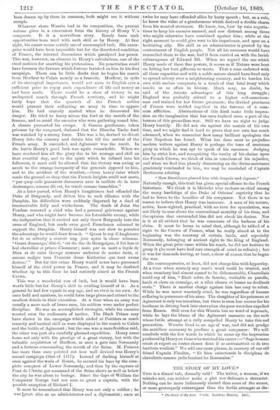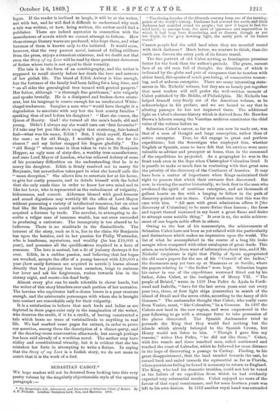THE STORY OF MY LOVE.*
THIS is a dismal tale, dismally told ! The writer, a woman, if we mistake not, can neither make a plot nor delineate a character. Nothing can be more ludicrously absurd than some of the scenes, or more grotesquely extravagant than the feeble attempts at dia- * The Story of My. Lore. 3 vols. London: Bentley. 1869. lope. If the reader is inclined to laugh, it will be at the writer, not with her, and he will find it difficult to understand why such a tale was written, or how, being written, the author could find a publisher. There are indeed mysteries in connection with the manufacture of novels which we cannot attempt to fathom. How these strange literary wares are produced, who buys them, and what becomes of them is known only to the initiated. It would seem, however, that the very poorest novel, instead of falling stillborn from the press, enjoys a transient existence, and we doubt not that even the Story of my Love will be read by those persistent devourers of fiction whose taste is not equal to their voracity.
The tale is in the form of an autobiography, and the writer is supposed to recall shortly before her death the love and sorrows of her girlish life. The blood of Edith Aubrey is blue enough, but the fortunes of the family had been falling for a long time, and " on all sides the genealogical tree teemed with genteel paupers." Her father, although " a thorough fine gentleman," acts vulgarly and speaks brutally. He is a dissipated and broken-down aristo- crat, but his language is coarse enough for an uneducated White- chapel tradesman. Imagine a man who " would have thought it a degradation to associate with any but the best county families " speaking thus of and before his daughter ! " Here she comes, the Queen of Beauty. Gad ! she turned all the men's heads, old and young. Didn't I always say she would turn out ' first favourite?' I'd take any bet you like she's caught that stuttering, fair-haired fool—what was his name, Edith ? But, I think myself, Herne is the man ; as for old Benjy, I wouldn't give him that for his chance l' and my father snapped his fingers gleefully." The "old Benjy !" whose name is thus taken in vain is Sir Benjamin Hopper, an ugly man of sixty-five, a wealthy iron-manufacturer, and once Lord Mayor of London, who has relieved Aubrey of some of his pecuniary difficulties on the understanding that he is to marry his daughter. Edith is firmly resolved not to marry Sir Benjamin, but nevertheless takes part in what she herself calls the " mean deception." She allows him to entertain her at his house, to give her costly presents, and to delude himself with the belief that she only needs time in order to know her own mind and to like her lover, who is represented as the embodiment of vulgarity, hideousness, and conceit. Aldermen blessed with good-humour and sound digestions may worthily fill the office of Lord Mayor without possessing a variety of intellectual resources, but an utter fool like Sir Benjamin could neither have filled that office nor acquired a fortune by trade. The novelist, in attempting to de- scribe a vulgar man of immense wealth, has not even succeeded iu producing a caricature. The incongruity is too absurd to be ludicrous. There is no similitude in the dissimilitude. The interest of the story, such as it is, lies in the claim Sir Benjamin has upon the heroine, and in her passion for Philip Warrender, who is handsome, mysterious, and wealthy (he has £10,000 a year), and possesses all the qualifications required in a hero of romance. The love is mutual, but a fit of jealousy destroys it for ever. Edith, in a sudden passion, and believing that her hopes are wrecked, accepts the offer of a young baronet with £20,000 a year (how easily fortunes are acquired in novels !) learns almost directly that her jealousy has been causeless, longs to embrace her lover and ask his forgiveness, rushes towards him in the stormy night, and meets—his dead body.
Almost every plot can be made tolerable in clever hands, but the writer of this story blunders over each portion of her narrative. The heroine who captivates half-a-dozen lovers is a poor creature enough, and the aristocratic personages with whom she is brought into contact are remarkable only for their vulgarity.
It is a satisfaction to believe that such lords and ladies as are depicted in these pages exist only in the imagination of the writer, who deserves the credit, if it be a credit, of having constructed a tale which bears no trace of verisimilitude to anything in real life. We had marked some pages for extract, in order to prove our assertion, among them the description of a dinner-party, and of the drawing-room conversation afterwards, but enough perhaps has been said already of a worthless novel. The author may have ability and constitutional vivacity, but it is evident that she has mistaken her forte in attempting to write a fiction. In saying that the Story of my Love is a foolish story, we do not mean to assert that it is the work of a fool.































 Previous page
Previous page